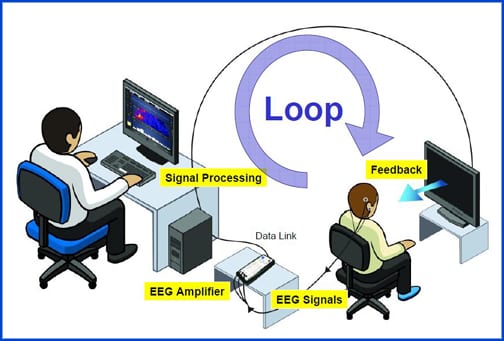
Siegfried Othmer, Ph.D., is Chief Scientist of The EEG Institute, and we have mentioned him before in the context of MindStream Academy and Dr. Adela Chirita-Emandi, who applies the Othmer method in her pediatrics practice in Romania.
Dr. Othmer, who wrote “Overview of Neurofeedback Mechanisms: Setting the Agenda for Research,” is interested not only in the applications of neurofeedback, but the underlying mechanisms of brain self-regulation. His curiosity is particularly intense in the areas of ADD (attention deficit disorder), the Anxiety-Depression spectrum, seizures, and — you guessed it — addictions.
Dr. Pretlow and many others believe that an addiction-prone person can become addicted to certain foods. Obviously, any information about addiction treatment will apply to the childhood obesity problem, and, of course, to the adult obesity problem.
Othmer proposes the “Regulatory Challenge” model of neurofeedback. The brain has native skills of self-regulation, but sometimes it jumps the track and needs to be reminded how to get back to its own intrinsic “timing and frequency relationships.” That is the “rewiring of the rewiring” we talked about last time. Neurofeedback shows the way, gives the brain a demonstration of how to tune itself up. It uses volitional control to train the subconscious brain processes that regulate a great number of bodily functions.
Speaking of a new field within a new field, Othmer describes his concept of neuro-regulation in the bio-electrical domain:
Neurofeedback can be seen as a generalization of what biofeedback has been traditionally concerned with. In the vernacular this has simply been called ‘relaxation,’ but in the scientific frame we are really concerned with self-regulation… The brain must be understood as an interacting network whose function is dependent on precise timing…
Physiologically speaking, he sees psychopathologies as “failures of brain internal communication.” But why do these communications fail? Because of “inappropriate activation at certain sites,” he says, or “inadequacies in communication within the networks.”
The other reason would be, “inappropriate coupling between different EEG frequencies.” There is dysrhythmia. The timing is off, and the brain misfires just like an engine whose spark plugs aren’t right.
Othmer says,
This model complements, but does not contradict, neurochemical models of brain dysfunction. Neurochemical models are completely incapable on their own of yielding an understanding of the temporal dynamics of brain function, for which we must rely on bioelectrical models that can describe the time course of brain events.
The author notes that, because it’s considered a non-medical procedure, neurofeedback is probably destined to remain classified as “complementary” or “alternative” medicine, and also that it’s unlikely to be covered by insurance.
On the plus side, neurofeedback is non-invasive and does not require hospitalization or pharmaceuticals. It is effective on a wide range of psychopathologies and clinical syndromes and even neurological deficits and organic brain disorders.
Othmer says,
The training can moderate our fears as well as regulate our drives such as appetite, thrill-seeking, and drug-seeking… By working with the EEG directly, the scope of our impact enlarges to all functions under the active management by the central nervous system.
Anything in the body that is run by the central nervous system can be improved by neurofeedback, that’s the promise. As we mentioned last time, the great thing about all this, in Othmer’s view, is that we don’t need to totally understand every detail in order to use the technology. Neurofeedback works despite the fact that we don’t yet know all the brain’s secrets.
He says,
Over time, learning occurs and brain behavior improves. Neurofeedback can therefore be considered ‘behavior mod for the brain.’ Through thousands of cues per minute, based on increasingly sophisticated analysis of the EEG, the brain is shaped toward improved self-regulation.
Once the rewiring has been rewired and self-regulation re-established, “the defining aspects of the condition will no longer meet criteria to sustain a diagnosis,” according to Othmer. In other words, the patient will be well and equipped to get on with life.
Your responses and feedback are welcome!
Source: “Overview of Neurofeedback Mechanisms: Setting the Agenda for Research,” EEG Info, 07/07
Image by Dr. Bernhard Wandernoth, used with permission. (Dr. Othmer says of the diagram, “It helps to concretize what is sometimes thought of as a process shrouded in mystery.”)

 FAQs and Media Requests:
FAQs and Media Requests: 











